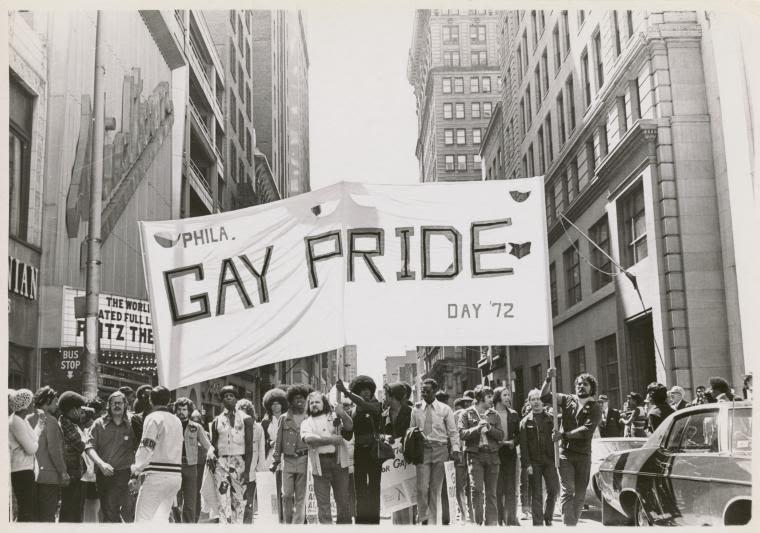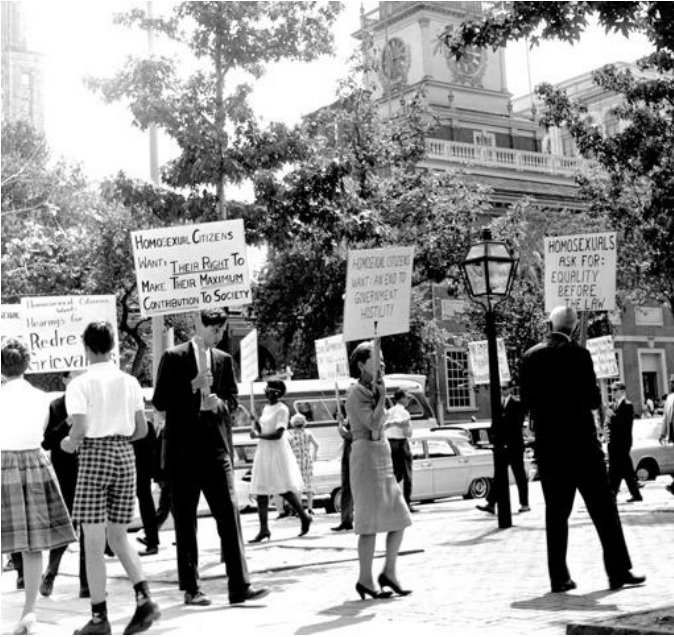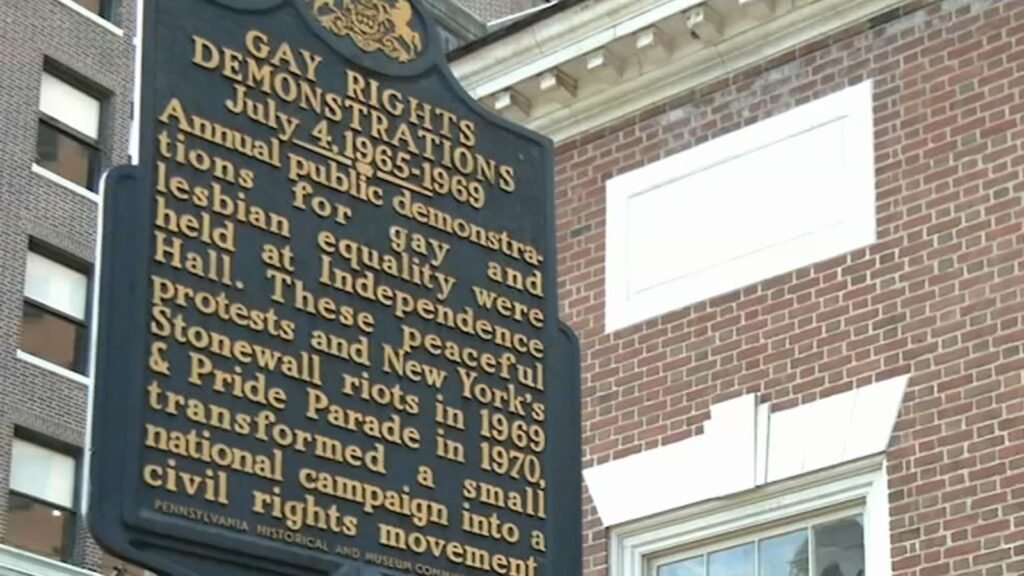If you’re curious to uncover the vibrant stories and rich heritage of Philadelphia’s LGBTQ+ community, look no further! Exploring the vibrant past and influential figures that have shaped Philadelphia’s LGBTQ+ history is an exhilarating journey waiting to be embarked upon. From the landmark Stonewall riots to the groundbreaking contributions of local activists, this article will guide you towards valuable resources and captivating narratives that will deepen your understanding of Philadelphia’s LGBTQ+ history. Get ready to immerse yourself in a narrative of resilience, progress, and celebration. Philadelphia is a city known for its vibrant LGBTQ+ community and rich history. If you’re interested in learning more about this important part of Philadelphia’s past and present, there are numerous resources available to you. From archives and libraries to museums and walking tours, here are ten ways you can immerse yourself in the LGBTQ+ history of Philadelphia.

1. Visit LGBTQ+ Archives and Libraries
1.1 John J. Wilcox Jr. Archives at William Way LGBT Community Center
The John J. Wilcox Jr. Archives at the William Way LGBT Community Center is a treasure trove of LGBTQ+ history in Philadelphia. From personal papers and photographs to organizational records and artifacts, this collection offers insight into the struggles and triumphs of the LGBTQ+ community over the years. Whether you’re a researcher or simply curious, a visit to this archive is a great way to delve into Philadelphia’s LGBTQ+ past.
1.2 The Barbara Gittings Collection at the Independence Branch of the Free Library of Philadelphia
The Barbara Gittings Collection, housed at the Independence Branch of the Free Library of Philadelphia, is another fantastic resource for exploring LGBTQ+ history in the city. This collection, named after LGBTQ+ activist Barbara Gittings, includes books, manuscripts, and other materials that document the LGBTQ+ experience. Whether you’re interested in fiction, non-fiction, or academic research, you’ll find something of interest here.
1.3 The LGBT History Project at the Independence Branch of the Free Library of Philadelphia
The LGBT History Project at the Independence Branch of the Free Library of Philadelphia is a community-driven initiative that aims to document Philadelphia’s LGBTQ+ history. This ongoing project collects and preserves oral histories, photographs, and other materials to ensure that the stories of LGBTQ+ individuals in Philadelphia are not forgotten. By visiting this project, you can contribute to the ongoing documentation of this vibrant community.
2. Explore Museums and Exhibitions
2.1 The William Way LGBT Community Center
In addition to its archives, the William Way LGBT Community Center also houses a museum that showcases the history and culture of Philadelphia’s LGBTQ+ community. With rotating exhibitions, you can learn about important figures, events, and milestones that have shaped the LGBTQ+ community in Philadelphia. The museum also offers educational programs and events, providing further opportunities to engage with LGBTQ+ history.
2.2 The Philadelphia Museum of Art
While the Philadelphia Museum of Art is not solely dedicated to LGBTQ+ history, it does feature artworks that explore LGBTQ+ themes and narratives. By visiting the museum, you can discover pieces of art that highlight the LGBTQ+ experience throughout history. From ancient artifacts to contemporary works, the museum offers a diverse and thought-provoking look at LGBTQ+ representation in art.
2.3 The Mütter Museum
The Mütter Museum, known for its macabre medical exhibits, may not seem like an obvious choice for exploring LGBTQ+ history. However, the museum has curated exhibitions that delve into the medical and social aspects of LGBTQ+ history. By visiting the Mütter Museum, you can gain a unique perspective on the challenges faced by the LGBTQ+ community in the healthcare system and society at large.

3. Attend LGBTQ+ Events and Festivals
3.1 Philadelphia Pride Parade and Festival
The Philadelphia Pride Parade and Festival is an annual event that celebrates the diversity and resilience of the LGBTQ+ community in Philadelphia. By attending this vibrant parade and festival, you can immerse yourself in the joy and pride of LGBTQ+ individuals and learn more about the history and culture of the community. With live performances, workshops, and vendors, there is something for everyone to enjoy at this iconic event.
3.2 OutFest
OutFest, also known as the National Coming Out Day Festival, is the largest LGBTQ+ National Coming Out Day event in the world. Taking place in Philadelphia’s Gayborhood, OutFest offers a day of celebration, education, and visibility for the LGBTQ+ community. By attending OutFest, you can join thousands of individuals in commemorating LGBTQ+ history while enjoying live entertainment, street vendors, and community resources.
3.3 LGBT History Month Events
October is LGBT History Month, and Philadelphia hosts a variety of events and programs to honor and explore LGBTQ+ history during this time. From panel discussions and film screenings to art exhibitions and performances, there are numerous opportunities to engage with LGBTQ+ history in the city. By attending these events, you can deepen your understanding of the struggles and achievements of the LGBTQ+ community in Philadelphia.
4. Take LGBTQ+ Walking Tours
4.1 The Philly Pride History Tour
The Philly Pride History Tour is a guided walking tour that takes you through Philadelphia’s LGBTQ+ history, highlighting important landmarks, businesses, and community spaces. Led by knowledgeable tour guides, this tour offers a firsthand look at the places and events that have shaped Philadelphia’s vibrant LGBTQ+ community. By walking the streets and hearing the stories, you’ll gain a deeper appreciation for the significance of these locations.
4.2 Philadelphia LGBTQ+ Historic Marker Walking Tour
The Philadelphia LGBTQ+ Historic Marker Walking Tour is a self-guided tour that allows you to explore LGBTQ+ history at your own pace. The tour features markers at various locations throughout the city that commemorate significant events, organizations, and individuals within the LGBTQ+ community. By following the tour, you’ll have the opportunity to discover hidden gems and gain a deeper understanding of Philadelphia’s LGBTQ+ past.
4.3 Philadelphia Gayborhood Walking Tour
Philadelphia’s Gayborhood, located in the Center City neighborhood, has long been a hub for LGBTQ+ culture and community. Taking a walking tour of this vibrant neighborhood allows you to explore the rich history and diverse establishments that make it a symbol of LGBTQ+ pride in Philadelphia. From notable bars and restaurants to community centers and public art, the Gayborhood offers a wealth of LGBTQ+ history to discover.

5. Join LGBTQ+ Organizations and Community Centers
5.1 William Way LGBT Community Center
The William Way LGBT Community Center is not just a place to visit, but also a place to get involved. By becoming a member or joining one of the many programs and groups offered at the center, you can actively participate in the LGBTQ+ community and learn more about its history. From support groups and educational workshops to volunteering opportunities and social events, the center provides a welcoming space for all individuals to connect and engage.
5.2 Philadelphia LGBTQ+ Chamber of Commerce
If you’re interested in LGBTQ+ history from an economic perspective, consider connecting with the Philadelphia LGBTQ+ Chamber of Commerce. This organization supports and promotes LGBTQ+-owned businesses and professionals in the Philadelphia region. By becoming a member or attending their events, you can learn about the contributions of LGBTQ+ individuals to the city’s economy and network with like-minded individuals.
5.3 GALAEI – Queer Latinx Social Justice Organization
GALAEI is a Philadelphia-based organization that advocates for the well-being and rights of LGBTQ+ individuals in the Latinx community. By joining GALAEI or participating in their programs and events, you can learn about the unique challenges and experiences of LGBTQ+ Latinx individuals in Philadelphia. Engaging with this organization provides opportunities to contribute to social justice efforts and gain a deeper understanding of the intersectionality within the LGBTQ+ community.
6. Read LGBTQ+ Books and Publications
6.1 Check out LGBTQ+ titles from the Free Library of Philadelphia
The Free Library of Philadelphia offers an extensive collection of LGBTQ+ books, from classic literature to contemporary works. By checking out these titles, you can explore LGBTQ+ history, culture, and experiences through the written word. Whether you’re interested in memoirs, poetry, or academic research, the library has something to cater to your interests.
6.2 Read local LGBTQ+ newspapers and magazines
Philadelphia is home to several LGBTQ+ newspapers and magazines that provide insightful coverage of local LGBTQ+ history, issues, and events. By reading publications such as “Philadelphia Gay News” and “Windy City Times,” you can stay up to date with current happenings within the LGBTQ+ community and gain a deeper appreciation for its past and present.

7. Watch LGBTQ+ Documentaries and Films
7.1 Philadelphia LGBTQ+ Film Festival (qFLIX)
The Philadelphia LGBTQ+ Film Festival, known as qFLIX, showcases a wide range of LGBTQ+ films that explore diverse stories and perspectives. By attending the festival, you can watch documentaries and films that delve into LGBTQ+ history and culture, offering firsthand accounts and insights into the lived experiences of LGBTQ+ individuals in Philadelphia and beyond.
7.2 The Tacony LAB Community Cinema
The Tacony LAB Community Cinema is an inclusive space that screens a variety of films, including LGBTQ+ documentaries and features. By attending screenings at the Tacony LAB, you can explore LGBTQ+ history through film and engage in discussions with fellow audience members. This cinema provides a welcoming environment for film enthusiasts and those interested in LGBTQ+ history alike.
8. Connect with LGBTQ+ Historians and Researchers
8.1 Contact the LGBTQ+ Archives and Libraries
If you have specific questions or would like to delve deeper into LGBTQ+ history in Philadelphia, reach out to the LGBTQ+ archives and libraries mentioned earlier. These institutions have knowledgeable staff and resources that can provide information and guidance on various aspects of LGBTQ+ history. By connecting with these experts, you can gain valuable insights and develop a deeper understanding of LGBTQ+ history.
8.2 Reach out to LGBTQ+ history scholars at local universities
Philadelphia is home to several universities with LGBTQ+ studies programs or departments that focus on LGBTQ+ history and research. Reach out to professors or researchers in these fields to learn more about their work and possibly engage in conversations about Philadelphia’s LGBTQ+ history. By connecting with these scholars, you can tap into their expertise and potentially collaborate on future projects.

9. Utilize Online Resources
9.1 Visit Philly LGBT
Philly LGBT is an online resource that provides information and resources related to LGBTQ+ history in Philadelphia. Through their website, you can access articles, interviews, and event listings that delve into various aspects of LGBTQ+ culture and history. By exploring this online platform, you can gain a wealth of knowledge and stay up to date with LGBTQ+ happenings in the city.
9.2 Explore digital collections and exhibits
Many archives and libraries now offer online access to their collections and exhibits. Take advantage of these digital resources to explore LGBTQ+ history from the comfort of your own home. Online platforms such as the Digital Public Library of America and the Internet Archive offer a vast array of LGBTQ+ resources that can enhance your understanding of Philadelphia’s LGBTQ+ history.
9.3 Join LGBTQ+ history forums and online communities
Engaging with LGBTQ+ history forums and online communities allows you to connect with individuals who share your interest in LGBTQ+ history. By participating in discussions and sharing resources, you can expand your knowledge and learn from others who are passionate about LGBTQ+ history. Platforms such as Reddit and Facebook groups offer opportunities to connect with like-minded individuals and exchange valuable insights.
10. Engage with Oral History Projects
10.1 Philly LGBT Oral History Project
The Philly LGBT Oral History Project collects and preserves the stories and experiences of LGBTQ+ individuals in Philadelphia through recorded interviews. By engaging with this project, you can listen to firsthand accounts of LGBTQ+ history and gain a deeper appreciation for the struggles and resilience of the community. These oral history interviews provide a unique insight into Philadelphia’s LGBTQ+ history and serve as a testament to the diverse experiences within the community.
10.2 LGBT Elder Initiative StoryCorps Project
The LGBT Elder Initiative StoryCorps Project involves recording and preserving the stories of LGBTQ+ elders in Philadelphia. By listening to these stories, you can gain an intergenerational perspective of LGBTQ+ history and witness how it has evolved over time. These personal narratives provide a valuable connection to the past and highlight the diverse experiences within the LGBTQ+ community.
With these ten ways to learn about Philadelphia’s LGBTQ+ history, you can dive into the rich and diverse experiences of the community. From exploring archives and museums to attending events and engaging with online resources, there are opportunities for individuals of all backgrounds and interests to connect with LGBTQ+ history in the city. By immersing yourself in these resources and engaging with the community, you can develop a deeper understanding and appreciation for Philadelphia’s LGBTQ+ history.
